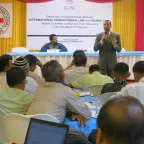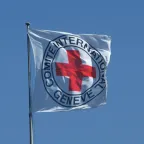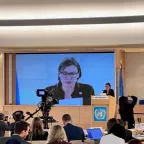Philippines: Deepening dialogue on humanitarian law and Islamic law
… aims to highlight the common ground between international humanitarian law (IHL) and its equivalent in Islamic …
… aims to highlight the common ground between international humanitarian law (IHL) and its equivalent in Islamic …

… and ensure better compliance with the law. …

… Red Cross, this immersive five-day course in international humanitarian law (IHL) is open to humanitarian practitioners …

… Mirjana Spoljaric, president of the International Committee of the Red Cross … risks that could result if international humanitarian law is not better respected. “The magnitude of …

… was part of the ICRC's Strengthening International Humanitarian Law initiative, and was organized pursuant to …
… only in the last 150 years have States made international rules to limit the effects of armed conflict for humanitarian reasons. The Geneva Conventions … Usually called international humanitarian law (IHL), it is also known as the law of war …

… International humanitarian law (IHL) is a set of rules that seeks, for … of armed conflict". IHL is part of public international law, which is made up primarily …
… given by Mirjana Spoljaric, President of the International Committee of the Red Cross, at … goal: to ensure states respect and uphold humanitarian law. "Our work is complementary and mutually …

… Mirjana Spoljaric, president of the International Committee of the Red Cross … strengthen compliance with international humanitarian law (IHL) as part of military planning and …

… whether a situation of violence is an international armed conflict (IAC) or a … armed conflict (NIAC) under international humanitarian law (IHL) – is key for understanding what rules …
Try one of the following resources:
Created in 1863, the ICRC library, alongside the ICRC archives, provides an indispensable documentary reference on the organization itself and international humanitarian law.
International humanitarian law is based on a number of treaties, in particular the Geneva Conventions of 1949 and their Additional Protocols, and a series of other instruments.
Customary international humanitarian law consists of rules that come from "a general practice accepted as law" and that exist independent of treaty law.